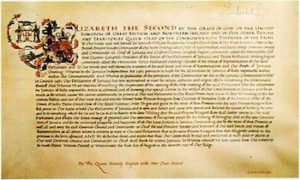
*On this date in 1962, Jamaica celebrates its independence from British colonial rule.
The Caribbean island was settled first by hunter-gatherers from the Yucatan and then by two waves of Arawak people from South America. Christopher Columbus arrived in Jamaica in 1494 and took it for the Crown of Castile. At this time, over two hundred villages existed in Jamaica, mainly on the south coast and ruled by caciques, or "chiefs of villages." The Spanish Empire began its official rule in Jamaica in 1509, with conquistador Juan de Esquivel and his men formally occupying the island. The Spaniards enslaved many native people, overworking and killing them to the point that many perished within fifty years of European arrival.
Subsequently, the lack of indigenous labor was resolved by bringing in African slaves. Disappointed by the lack of gold on the island, the Spanish mainly used Jamaica as a military base to supply colonizing efforts in the mainland Americas. After 146 years of Spanish rule, a large group of British sailors and soldiers landed in Kingston Harbor during the Anglo-Spanish War on May 10, 1655. The English, who had set their sights on Jamaica after a disastrous defeat in an earlier attempt to take the island of Hispaniola, marched toward Villa de la Vega, the island's administrative center. Spanish forces surrendered without much fight on May 11, many of them fleeing to Spanish Cuba or the northern portion of the island. British colonial jurisdiction over the island was established, with the newly renamed Spanish Town named the capital and home of the local House of Assembly, Jamaica's directly elected legislature.
Over the years, escaped slaves joined Indigenous survivors in the mountains, forming a society known as Maroons. Maroons won a war against British forces (1728–1740) but lost a second war (1795–1796). In the 1800s, slavery was abolished, and Jamaicans gained suffrage, although the British still held power. Early in the 20th century, Marcus Garvey promoted black nationalism and became the most notable black leader of his day. During the Great Depression, workers protested inequality and fought the authorities in Jamaica and other Caribbean colonies.
In 1943, labor leader Alexander Bustamante won an electoral victory and established a new, more liberal constitution. After World War II, Jamaican leaders developed the government structure to prepare for independence. In 1962, Bustamante’s party won the election, and he became premier. That same year, the UK Parliament officially granted Jamaica independence, and Bustamante became the independent country’s first prime minister.